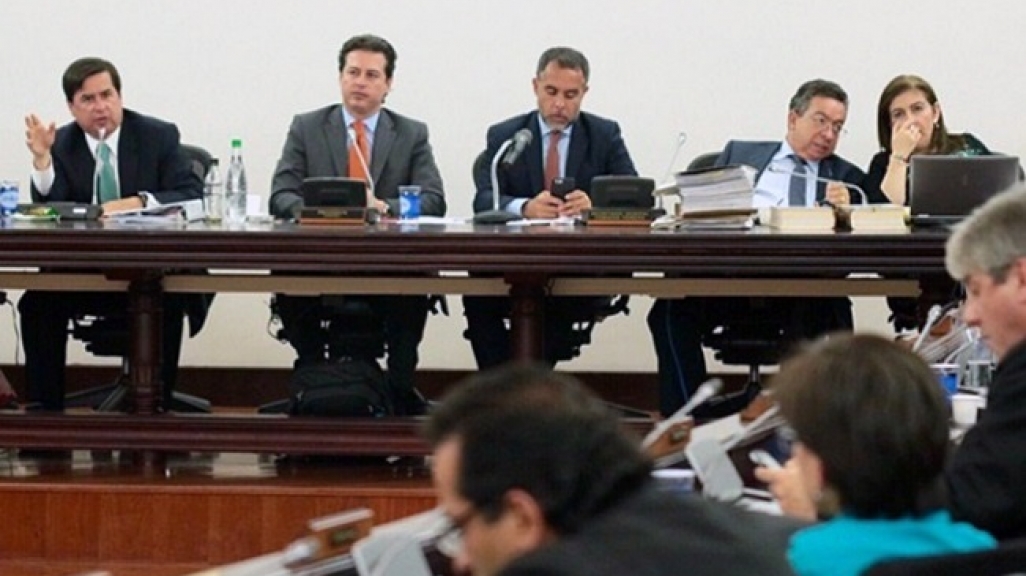Colombia Update: Constitutional Reforms Seek to Clean Courts
Colombia Update: Constitutional Reforms Seek to Clean Courts
A number of judicial corruption cases moved the government to push through a series of reforms.
Last week, the president of Colombia’s Constitutional Court, Jorge Pretelt, appeared in court—except this time, he was the one on trial. One of his fellow justices brought a complaint against him over charges that he allegedly solicited a $200,000 bribe from an attorney for a now-defunct energy company in exchange for a favorable ruling. Despite mounting calls for him to step down, Pretelt maintains his innocence and, after a series of delays, testified on April 9. His wife testified on April 14. On top of this, two Supreme Court justices resigned late last month, one over bribery charges in a murder trial.
The scandals have turned up the heat on the need to reform the Colombian judiciary, which is being forced to reckon with years of complaints about nepotism and bias throughout its highest governing bodies.
On March 25, President Juan Manuel Santos introduced a series of far-reaching reforms to Colombia’s 1991 Constitution that are now working their way through the Colombian legislature as part of the Balance of Powers legislative act. “It is urgent that we put an end to the so-called ‘revolving door’ in which magistrates move from one court to the other,” he said in his address. “We want to proceed in this direction so that we can gain back the citizens’ confidence in the state, its procedures, and appointments especially the magistrates of our courts.”
The Balance of Powers legislative act itself was introduced in the fall, and subsequently approved by the House of Representatives. It is currently in review before the Colombian Senate’s First Committee, which hears matters regarding constitutional reform.
The Magistrates Tribunal: A New Court to Mete Out Justice to the Justices
At the heart of the reforms approved this week by the Senate is a measure that will replace the Accusations Committee—which is currently hearing Pretelt’s case—with a new Magistrates Tribunal, a type of supercourt that will hear cases against justices from the country’s highest legal bodies. In its 25 years of existence, the Accusations Committee has never removed an official from office (one former president was sanctioned, however the House of Representatives later absolved him). The new Magistrates Tribunal will have greater and more specific powers: whereas before cases were reviewed only by Congress and penalties were confined essentially to political slaps on the wrist, the new tribunal will be able to enact legal proceedings against officials, and also refer cases directly to the Supreme Court if and when need be.
Additionally, the tribunal’s five-person bench will comprise members elected to eight-year terms by Congress from a field of candidates in an open application process. It represents a significant departure from the old system of presidential appointments and nominations marked by cronyism. (A kerfuffle was kicked up when Santos—albeit acting in accordance with the current rules—signed a decree on the day before his address on transparency and judicial reform to appoint the first slate of officials to an initial two-year term with only congressional approval.)
As with the Magistrates Tribunal, Constitutional Court justices will be selected from a slate of candidates who’ve applied during an open application process and ranked based on a set of merits. The public and civil society organizations will also be able to take advantage of a 10-day waiting period to raise any doubts over questionable candidates.
The senators also approved a set of reforms on term limits for the president, the inspector general, the registrar, the public defender, the attorney general, and judges, which will prohibit them from moving from one office to another, and hence the process of political back-scratching. Additionally, they approved a measure that would prohibit the vice president and other officials from moving directly to the presidency; instead, officials who want to run for president must resign from office at least one year before they launch their campaigns.
That said, not everyone sees each reform as forward progress. One measure that came under fire during Senate debate is an article that will cement what is, essentially, the immunity judges have from prosecution for their decisions, a provision that some argue undercuts the authority of the proposed Magistrates Tribunal to hold justices accountable under the law. In the first draft of the bill, this immunity was not guaranteed, and the judges balked. Senators then added an article that states that judges of the country’s highest courts will be “inviolable” for their decisions, “unless it is shown that the decisions were made to unduly favor the interests of themselves or others.” Former Attorney General and current Senator Viviane Morales lambasted the article, calling it an “orangutan;” in other words, an egregious item subtly slipped into the bill. “To make judges untouchable is nothing short of absolute irresponsibility for judicial decisions,” she said.
Additional Legislation: Cutting the Umbilical Cord between Politics and Justice
A separate set of bills proposed by Santos will open up the courts to more transparency. “We need to cut, once and for all, the umbilical cord between the political class and the judiciary, which has done so much harm,” said Santos in his March 24 address. “We want to be sure that the political class does not participate in the selection of magistrates and judges. . . . We want judges who focus on judging and who don’t get caught up with electoral functions.”
One proposal would prohibit ex-justices from arguing cases before their former court or advising clients in such cases for at least five years after they’ve left the bench. Santos included a second item that would regulate lobbying in the high court. A third item would give the courts the ability to reform their rules for internal proceedings. This proposal could give the court the ability to replace Pretelt or change the rules for selection of cases to be heard.
Lastly, several high-ranking positions that were typically filled in back-door dealings will now be opened up to more thorough political processes. The comptroller general will be elected from a list of candidates in an open selection process, and local comptrollers will be selected in a similar manner. (Colombia’s former comptroller fled the country hours after her term ended in 2014, under charges of corruption and embezzlement.) The president will no longer be involved in the selection of the national registrar, the officer who, in turn, oversees election monitoring in the country.
Next Steps
The Senate’s First Committee will hold eight debates in total on the Balance of Powers legislative act, each of which will review a set of reforms that are part of the act. The senators will hold the final three debates on remaining points over the course of the current legislative session, which ends on June 28. After that, any differences between the versions passed by the Senate and House will be resolved in a special conference committee, a finalized version published in the official record, and then, barring any objections, signed into effect by the president.








